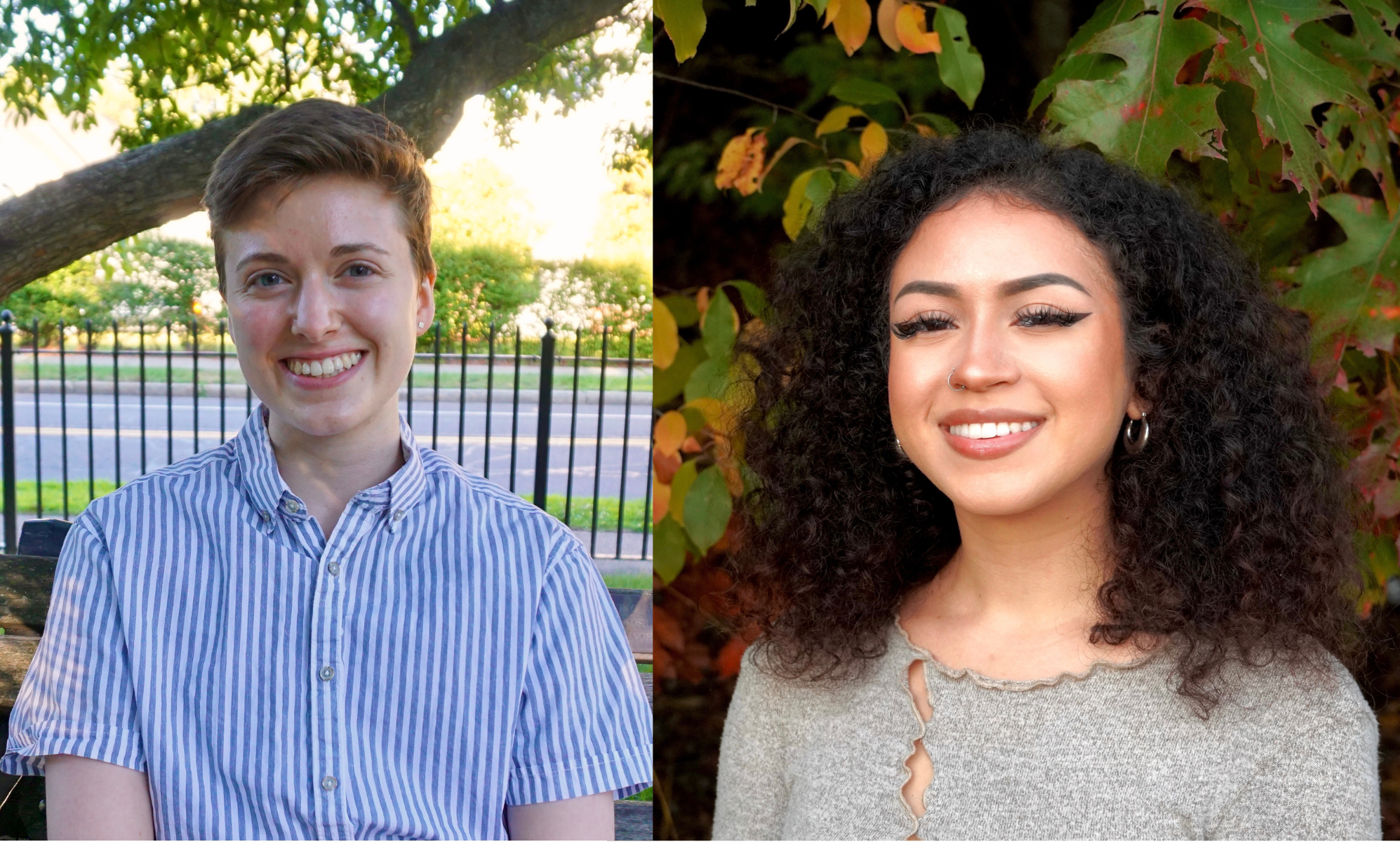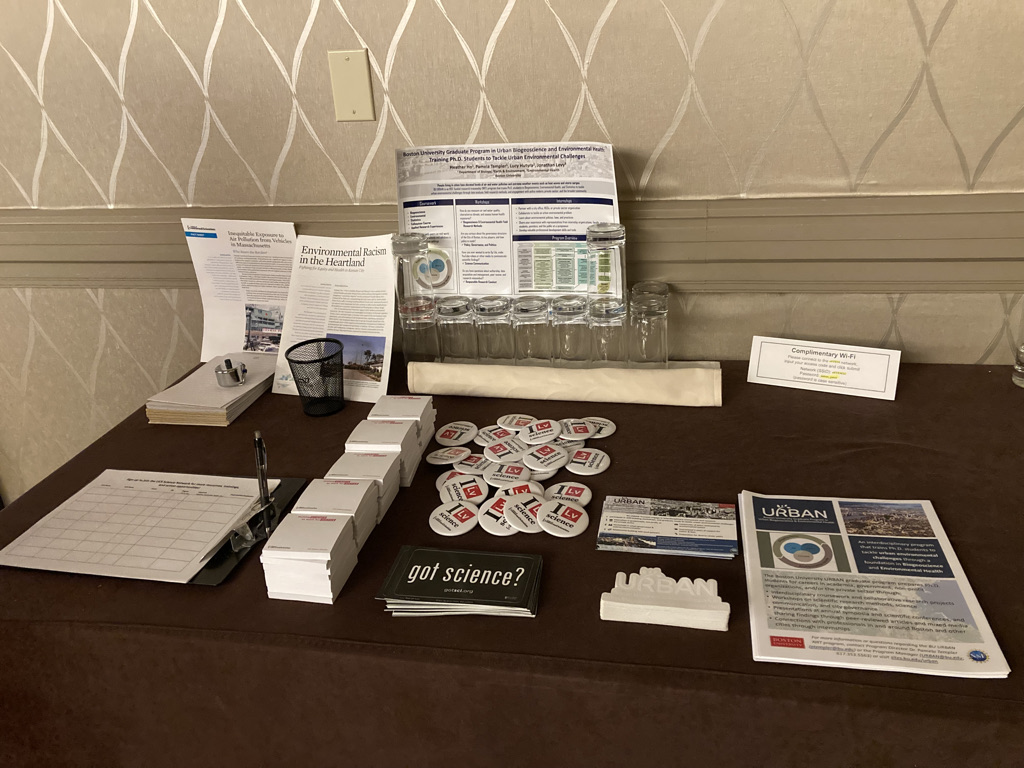URBAN Trainees Lead Workshop to Demystify Policymaker Engagement for Fellow Early-Career Scientists
On Saturday, November 12, 2022, URBAN trainees Emma Conrad-Rooney and Sasha Gilmore hosted a workshop along with Danielle Fox from the Union of Concerned Scientists called Demystifying Policymaker Engagement: Tips for Early Career Scientists by Early Career Scientists at the 2022 National oSTEM Annual Conference. Emma and Sasha created the workshop in partnership with URBAN trainee Katie Atherton and the Union of Concerned Scientists. Lauren Magee, our URBAN Impact Intern, interviewed Emma and Sasha about their experience. Read on to learn about their motivation for leading the event, along with how the URBAN-sponsored science policy trip they went on this summer played a catalyzing role.
What was the impact you hoped to make by hosting this workshop?
ECR: As the President of BU oSTEM (Out in STEM), I was excited about the opportunity to host this workshop since it bridged my interests in science policy with supporting LGBTQ+ people in STEM fields. Having attended the BU URBAN science policy trip to DC this past summer, I was eager to share experiences and tips about engaging with policymakers that I had learned on this trip. Prior to the URBAN DC trip, I had considered policymaker engagement very daunting. With this workshop, I hoped that participants would learn that policymaker engagement can be accessible, especially if you learn how to prepare for an organized and engaging meeting, as we had learned from the Union of Concerned Scientist training on the URBAN DC trip.
SG: I hoped to show those who have not had interactions with policymakers that it is something completely within reach—that they can accomplish within their city, state, or national governments. Policymaker engagement always intimidated me. I viewed these policymakers as individuals that I didn’t have access to, despite them representing me as a citizen in their district. However, following my own engagement with them, I realized my fears were misplaced, and it was actually an informative and quite easy experience to go through. I wanted to soothe worries that others had in terms of engaging in policy if they never have before, or how to continue engaging with policymakers without holding back on issues that they deeply care about. Providing them with the tools and skillsets was the perfect first step to lay a concrete foundation for them to take on a similar journey in their own districts and with their own representatives.
What were the main takeaways from the event?
ECR: Sasha Gilmore, Danielle Fox from the Union of Concerned Scientists, and I developed a workshop for the 2022 National oSTEM Annual Conference that promoted attendee engagement and implementation of concepts learned. We began with an introduction to the importance of policymaker engagement and crafting a clear, personal story to share with policymakers. Sasha and I then discussed our experiences on the URBAN trip to DC as well as our process of developing personal story pitches for policymakers. The workshop ended with structured time for attendees to work in pairs to craft and practice giving one-minute pitches in preparation for a policymaker visit down the road. This proved to be a valuable workshop format which enabled people to learn about policymaker engagement as well as develop and practice pitches with their peers.
SG: In terms of those in attendance, we hoped that their takeways would include that engaging with policymakers is not as daunting as it might seem, and when equipped with the right knowledge, is actually a very accessible activity. We also hoped that the exercise they participated in to develop their elevator pitch aided them in creating a direct and substantial ask in order to get their point across in the most efficient way possible. Finally, we hoped to instill in them to not give up. Our congresspeople represent us; they work for us. Therefore, asking for something that would in turn help us as a community should be normal, and not something out of the ordinary. Persistence is key, and sometimes is necessary in order to get them moving in the right direction on a specific issue.
How has BU URBAN facilitated your ability to present this information?
SG: BU Urban’s science policy trip to D.C. this past June was the catalyst to my policy journey. The training we received through the Union of Concerned Scientists (UCS) – who we partnered with on this workshop – when arriving in Washington, and the following trip to the Hill, gave me the sufficient footing to feel confident in my policy engagement abilities. Through our debrief sessions with fellow URBAN students as well as the staff, I felt self-assured to relay what I had learned to a wider audience and provide tips and advice on how to go about the same journey. I am very thankful to URBAN and NSF for allowing me to attend this trip that has broadened my scope in terms of my interdisciplinary education that the program aims to accomplish.
ECR: This workshop came out of the connections we made with the Union of Concerned Scientists during the URBAN trip to DC. Melissa Varga, Shreya Durvasula, and Danielle Fox from Union of Concerned Scientist reached out to URBAN Trainees who were also part of BU Science Policy Network (formerly BU STEPUP). URBAN trainees Katie Atherton, Sasha Gilmore, and I worked with the staff from Union of Concerned Scientists to develop a workshop based on our experiences learning about and practicing policymaker engagement while in DC. The BU URBAN program gave us the education and practical experiences which were the inspiration for giving this workshop and also facilitated the networking and relationship-building which led to this workshop invitation in the first place.
Is there anything that hasn’t been mentioned that you’d like to add?
SG: Leading this workshop was the first I’ve done of this kind, and it was a great opportunity to provide guidance to those that attended the event. I am optimistic that many left with a refined understanding and willingness to reach out to their policymakers through the discussions they had with each other, and subsequently with us. When there is a will, there is a way, and we should always remember that when advocating for change for the betterment of ourselves and those around us.

